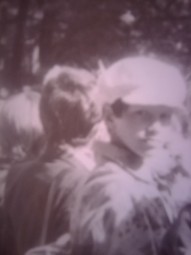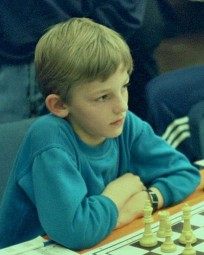Bukayev Yury â Grischuk Alexander (game, std): 1
This tournament chess game Bukayev Yury V. Grischuk Alexander (Aleksandr) I. was played at the Moscow Junior Championship, in 1993, almost 30 years ago, with a standard time control. It was the 2nd tour, and it was a Swiss-system tournament, we both had 1 tournament point after the 1st tour. Alexander Grischuk was 10 years old that time, I was 11. He was a real chess star in the world among young chess players: he was the U10 World Vice-Champion (1992). He was almost a CM in chess, I had a weak 2nd category only, the first chess tournament in my life was started in the end of 1991 only... Nobody prepared me to the game against Alexander, unfortunately. I have lost this game in 42 moves by resignation after 2 hours (approximately) of fighting.
It is interesting, enough large part of my memorable events with chess stars has happened in 1993, 2003, 2013, 2023. Thus, for example, in 2003 the famous Soviet and Russian GM Igor A. Zaitsev said: Yury Bukayevs analyses are strong. They should be published , but lets return to 1993. Here is a start of this my memorable game against the future Blitz World Chess Champion.

Yury Bukayev in 1991

Alexander Grischuk in 1992
1.d4 Nf6 2.c4 c5 3.Nf3 cd 4.Nd4 e5
Alexander played enough rapidly here, before it and after it, in contrast with me.
5.Nf3 e4 6.Nd4 d5 7.e3
Here we have an important theoretical position of the Anti-Benoni system (the English Opening, A31). For that old time the main theoretical commentary for these opening moves in books was the following: 5.Nb5 is a main way, and here White fights for an advantage; 5.Nf3 is not a weak way, but the exact Blacks play gives a good position to Black. I was a natural chess player in my childhood a player with no knowledge of opening variations unfortunately, and my moves were a result of my pure thinking. In this situation the move 5.Nf3 is probably better, because it leads to a less complicated and a less sharp fight, than 5.Nb5. It should be noted that after 5.Nf3 the response 5 Nc6 (Novikov Bukhman, 1975) was mentioned in some literature of that time, but I think, I could avoid the further way of this game (6.Nc3) and could choose the less complicated way for White - 6.a3 AN - even in my childhood.
7 Nc6?!
It was a not strong and a not theoretical move. Was it a novelty? It maybe, for Alexander Grischuk and for his trainer Maxim V. Blokh, an opening expert, it was a novelty. In 2023 I could find one more old game in databases with this sequence: Paulsen Haugsdal, 1991.
8.Nc3 dc?!
It was also a not strong move. In the above drawn game Paulsen Haugsdal, where opponents have done the same moves, Whites reaction was right at first, in my opinion: 9.Nc6! Qd1 10.Nd1! bc 11.Bc4!. Thus, here White stands better: Black has a weak isolated pawn c and doesnt have a compensation for it. But White should play exactly. Here Black has made a very good move 11 Bd6! (with the idea Bd6-e5), and Whites best response, in my opinion, should be 12.Bd2! AN with the advantage. Instead of it, Mr. Paulsen chose another way and started to make mistakes
Maxim V. Blokh watched our game, and I cant know what he thought. Probably, both 7 Nc6 and 8 dc were Alexander Grischuks own ideas, not ideas of his trainer.
The best way for Black was, in my opinion, the following: 8 Bb4! (this move was used in later games)
I) 9.Nc6 AN bc 10.Qa4 Bc3 11.bc 0-0 [11 Bd7!?] 12.Ba3 [12.Qc6? Qa5! 13.Rb1 (13.Bd2 Bd7) 13 Qa2!, and Black stands better] 12 Re8 13.Qc6 Bd7 [13 Be6!?] 14.Qd6 Re6 15.Qc5 Rc8 = ;
II) 9.Qb3! AN Nd4 [9 Ba5 10.cd Nd4 11.Qa4 Bd7! (11 Qd7 12.Qa5! Nc2 13.Kd1 b6 14.Bb5 ba 15.Bd7, and White stands better) 12.Qd4, and Blacks compensation for a pawn isnt enough, probably] 10.ed Ba5 [10 Bc3 11.bc, and White stands slightly better] 11.c5!?, and White stands slightly better.
Auteur : Y.Bukayev
(c) Bukayev, Yury (istinayubukayev@yandex.ru)
© 2023 Yury V. Bukayev (Copyright © Bukayev Yury Vyacheslavovich 2023). All rights reserved.
[A legal using of this investigation with a reference to it is permitted and doesnt require authors consent.]